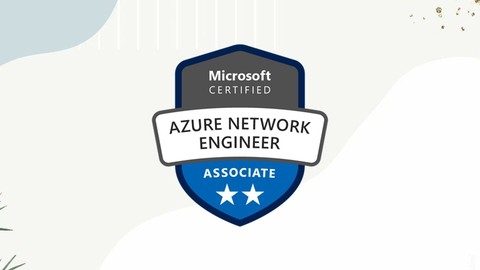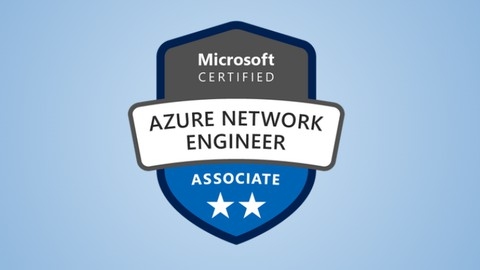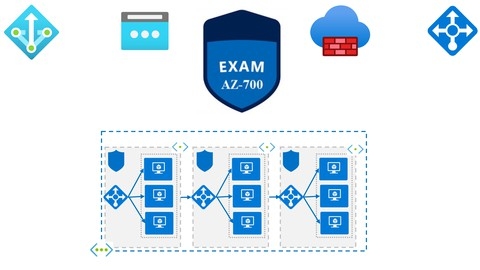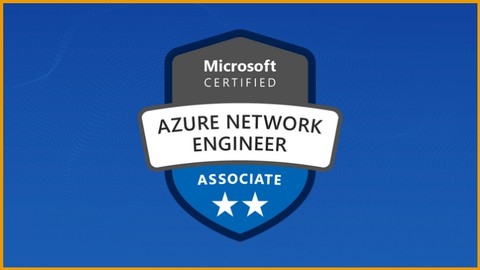Mastering Azure networking is essential for any cloud professional, and the Microsoft AZ-700 certification is a highly sought-after credential for demonstrating your expertise.
However, finding the right course to help you prepare for this exam can be overwhelming.
You need a course that’s comprehensive, engaging, and provides hands-on experience to build confidence and solidify your understanding of Azure networking concepts.
We’ve reviewed a wide range of Microsoft AZ-700 courses on Udemy, and our top pick is AZ-700: Designing and Implementing Azure Networking Solutions by SIMS.
This comprehensive course is highly rated for its detailed coverage of core networking principles, practical exercises, and real-world scenarios.
You’ll gain a deep understanding of virtual networks, load balancing, security, hybrid connectivity, and more, equipping you with the knowledge and skills to confidently design and implement Azure networking solutions.
While this is our top recommendation, there are many other excellent courses available on Udemy that cater to different learning styles and preferences.
So, keep reading to discover other highly-rated options for the best Microsoft AZ-700 courses on Udemy.
AZ-700:Designing and Implementing Azure Networking Solutions
This AZ-700: Designing and Implementing Azure Networking Solutions course is your comprehensive guide to mastering Azure networking, taking you from fundamental concepts to advanced deployments.
You’ll start by connecting your on-premises world to Azure, building both Point-to-Site and Site-to-Site VPN connections.
You’ll dive into security aspects, understanding how to leverage Azure Active Directory and RADIUS authentication to secure your connections.
But this course is about more than just theory – you’ll get hands-on with building Azure virtual networks, deploying virtual machines, and configuring routing services.
You’ll learn to use essential tools like Network Security Groups (NSGs) to define granular security rules and Azure Firewall to protect your applications.
You’ll master DNS zones to manage name resolution within Azure, and discover the power of Azure Private DNS for even greater control.
The course then delves into the critical area of hybrid networking, showing you how to seamlessly integrate your on-premises infrastructure with Azure.
You’ll learn about Azure ExpressRoute, a dedicated private connection to Azure, and understand its high availability and global reach capabilities.
You’ll also explore Azure Virtual WAN, a central management point for your networking needs, allowing you to manage multiple VPN, ExpressRoute, and Site-to-Site connections from a single location.
And, you’ll master the use of Service Endpoints and Private Endpoints for secure access to Azure services like Azure Storage and Azure SQL Database.
The course concludes by focusing on securing and monitoring your Azure network.
You’ll explore the powerful Network Watcher service, which provides tools for troubleshooting connectivity issues and monitoring network performance.
You’ll also learn how to use Application Security Groups to define security rules based on application groups rather than individual virtual machines.
AZ-700 Designing and Implementing Azure Networking Exam Prep
This course offers a thorough introduction to Azure networking, covering the fundamentals you need to confidently navigate cloud infrastructure.
You’ll start by understanding virtual networks and subnets, then dive into practical exercises like setting up your own virtual network.
The course equips you with the knowledge to manage secure connections between your on-premises network and Azure through site-to-site and point-to-site VPN configurations.
You’ll explore various load balancing options, including Azure Load Balancer, Application Gateway, and Traffic Manager, learning how to optimize traffic distribution and ensure high availability for your applications.
Security is a crucial aspect of any cloud infrastructure, and this course addresses it with in-depth coverage of Azure Firewall, Network Security Groups (NSGs), and Web Application Firewalls (WAFs).
You’ll learn how to implement these tools effectively to protect your applications from common threats and unauthorized access.
The course goes beyond the basics, guiding you through advanced concepts like Virtual WAN and Azure Private Link.
These services offer secure and scalable solutions for connecting your Azure resources, giving you greater control over your cloud environment.
This comprehensive course includes practice tests designed to prepare you for the Microsoft AZ-700 certification exam.
You’ll gain lifetime access, allowing you to learn at your own pace and revisit the material whenever necessary.
AZ-700 Designing & Implementing Azure Networking with SIMS
This course will equip you with the knowledge and practical skills needed to design, implement, and manage secure and efficient Azure network infrastructures.
You’ll begin by grounding yourself in the Microsoft environment, understanding core components like Active Directory domains, RAS, DMZ, and virtualization.
You’ll also explore the fundamentals of Microsoft Cloud Services, including the essential Azure Active Directory (Entra ID), currently undergoing a name change.
The course then guides you through a logical progression of concepts, ensuring a solid foundation before advancing to more complex topics.
You’ll master the art of designing and implementing private IP addressing for Azure resources and learn how to manage network segmentation with address spaces.
You’ll create virtual networks (VNets) and explore the powerful concept of VNet peering, optimizing connectivity between different parts of your Azure infrastructure.
Next, you’ll delve into subnet delegation and the creation of prefixes for public IP addresses.
You’ll learn to design and implement custom public IP address prefixes, even bringing your own IP addresses for greater control over network traffic.
Understanding name resolution, both inside and outside your VNet, is crucial, and you’ll learn to configure public and private DNS zones for seamless communication within your network.
As you progress, you’ll explore VNet connectivity and routing, delving into service chaining and the design of VPN connections between VNets.
You’ll learn to implement VNet peering and configure user-defined routes (UDRs) to fine-tune network traffic flow.
Mastering forced tunneling and gaining the ability to diagnose and resolve routing issues will make you a confident network troubleshooter.
The course introduces you to Azure Route Server and its use cases for Virtual Network NAT gateways, equipping you with the skills to control traffic flow effectively.
You’ll then transition to monitoring and analyzing your Azure network.
You’ll learn to configure monitoring, network diagnostics, and logs in Azure Network Watcher, ensuring proactive identification and resolution of network health issues.
You’ll gain an understanding of the powerful distributed denial-of-service (DDoS) protection and learn how Microsoft Defender for DNS can enhance security.
The course delves deeper into VPN technologies, teaching you to design, implement, and manage both site-to-site and point-to-site VPN connections.
You’ll learn to select appropriate VNet gateway SKUs and understand the differences between policy-based and route-based VPN connections.
Practical experience with IPsec/IKE policies and the ability to diagnose and resolve connectivity issues will make you a proficient VPN administrator.
You’ll then explore Azure ExpressRoute, a powerful tool for connecting your on-premises network to Azure.
You’ll learn to choose the right connectivity model, SKU, and tier based on your needs.
Mastery of concepts like ExpressRoute Global Reach, FastPath, and ExpressRoute Direct will equip you to optimize network performance and ensure reliable connectivity.
The course introduces the architecture and design of Azure Virtual WAN, a comprehensive solution for managing complex, geographically dispersed networks.
You’ll learn to identify the right use cases for Azure Virtual WAN and design your architecture, selecting appropriate types and services.
You’ll gain practical experience creating Virtual WAN hubs and deploying gateways, learning to configure virtual hub routing and integrate with third-party NVAs.
As you progress, you’ll delve into the world of Azure Load Balancers, mastering their features and capabilities for efficient traffic management.
You’ll learn to select appropriate SKUs and tiers, understand the differences between public and internal Load Balancers, and gain hands-on experience creating and configuring Load Balancers, including load balancing rules and inbound and outbound NAT rules.
Next, you’ll tackle Azure Application Gateway, a powerful tool for managing web traffic.
You’ll learn to identify appropriate use cases and gain hands-on experience creating and configuring Application Gateways, including back-end pools, routing rules, HTTP settings, health probes, listeners, Transport Layer Security (TLS), and rewrite sets.
You’ll also explore Azure Front Door, another valuable tool for managing web traffic, comparing its capabilities to Application Gateway.
You’ll then learn to design and implement Azure Traffic Manager, a service that helps manage the distribution of your web traffic across different Azure regions.
You’ll explore different routing methods and gain hands-on experience creating and configuring Traffic Manager profiles.
The course covers the crucial topic of Azure Private Link service and private endpoints, enabling secure and private access to Azure resources.
You’ll learn how to plan and create Private Link services, integrate them with DNS, and create private endpoints to control access to Azure resources.
You’ll then move on to explore the world of network security groups (NSGs) and application security groups (ASGs).
You’ll learn how to create and configure NSGs to control inbound and outbound traffic to your Azure resources, and how to use ASGs to group and manage resources for network security purposes.
Microsoft AZ-700 Exam certification Tests 2024
You’ll delve into the crucial aspects of designing and implementing Azure virtual networks, learning how to connect your resources within the Azure environment.
Understanding Azure load balancers for distributing traffic across your applications is also covered, a critical skill for any network architect.
The course’s strength lies in its comprehensive practice tests, featuring over 500 questions designed to simulate the real exam experience.
These tests are not just assessments; they are learning tools.
Each question is meticulously crafted to illuminate the intricacies of Azure networking, and detailed explanations accompany each answer, providing valuable insights to solidify your understanding.
You’ll be exposed to a wide range of topics, from network security and performance optimization to ensuring high availability and disaster recovery.
This ensures you’re well-equipped to tackle the diverse challenges presented in the exam.
And, the course content is regularly updated to align with the latest exam requirements, ensuring you’re studying the most relevant and up-to-date information.
The AZ-700 certification itself is highly respected within the industry, serving as a testament to your expertise in designing and implementing networking solutions on Azure.
This course provides the tools and knowledge you need to confidently achieve this valuable credential.
AZ-700 Azure Networking 100% Original Practice Exam - JAN'24
Created by Scott Duffy, an Azure expert, the course offers four comprehensive practice tests, each containing 25 questions designed to mirror the real exam.
You’ll get a feel for the exam format and content with these practice tests, which are updated with the latest exam details.
The tests cover all the essential topics, including designing core network infrastructure, connectivity services, application delivery services, private access to Azure services, and securing network connectivity.
What I particularly appreciate is the inclusion of three timed tests.
These are essential for getting used to the pressure of the actual exam and gauging your progress in a realistic setting.
You’ll be able to identify areas where you need to focus your studies and build confidence as you go.
Don’t hesitate to take advantage of the 30-day money-back guarantee if you’re unsure about the course.
It’s a good indication of the creators’ confidence in the value they offer.
AZ-700 Designing Implementing Azure Networking Practice Test
Imagine this: you’re ready to tackle the Microsoft AZ-700 exam, but you need a solid way to test your knowledge and pinpoint any weak areas.
That’s where this practice test course comes in.
It’s packed with four full-length simulations designed to mirror the real exam, covering everything from core networking infrastructure to secure connectivity.
Each test isn’t just a quiz – it’s a learning experience.
You’ll get detailed explanations for every answer, whether right or wrong, so you truly understand the “why” behind the concepts.
This goes beyond simply identifying gaps; it helps you solidify your understanding and build confidence.
And let’s be honest, who doesn’t want to walk into an exam feeling ready to ace it? With this course, you’re not just practicing, you’re strategizing.
You’ll get a clear picture of your strengths and weaknesses, giving you the power to focus your studying and maximize your learning.
The goal here isn’t just to pass the exam; it’s to develop the skills and knowledge to succeed in the real world of Azure networking.
AZ-700: Microsoft Azure Networking Essentials & Strategies
This course caters to both beginners and experienced professionals, offering a comprehensive exploration of key concepts.
You’ll start by delving into the fundamentals of cloud computing and Azure’s role within it.
From there, you’ll dive into the core of Azure Virtual Networks, learning to construct secure and scalable network architectures.
The course covers essential aspects like network security groups, Azure Firewall, and traffic filtering, equipping you to build robust defenses.
Furthermore, you’ll gain valuable insights into load balancing and traffic management strategies.
Mastering Azure Load Balancer, Application Gateway, and Traffic Manager will be crucial for optimizing performance and ensuring high availability.
The course also highlights essential security practices with a focus on implementing Network Security Groups, Azure Firewall, and DDoS protection, crucial for safeguarding your network assets.
Beyond the basics, you’ll explore the intricacies of hybrid networking, seamlessly connecting your on-premises network to Azure.
This includes utilizing Azure ExpressRoute, Azure Private Link, and VPN Gateway configurations for seamless integration.
You’ll also learn how to leverage Azure Bastion for secure remote access and discover cost-optimization strategies for efficient networking within your Azure environment.
The course culminates with an exploration of advanced networking services like Azure Content Delivery Network (CDN), Azure Front Door, and Azure Virtual WAN.
These advanced features empower you to handle real-world networking challenges with confidence, ultimately preparing you to architect high-availability solutions and navigate complex network security scenarios.
While the course provides a comprehensive overview of Azure networking, it’s important to note that it’s not a substitute for official vendor certification materials.
However, it serves as an excellent starting point for individuals seeking a deeper understanding of Azure’s networking capabilities and a pathway to mastering this crucial aspect of the cloud.
Designing and Implementing Microsoft Azure Networking Day 1
This course tackles the critical concepts you need to master for the exam, starting with the core building blocks of Azure’s virtual networking capabilities.
You’ll gain a solid understanding of how virtual networks and subnets operate within Azure.
The course dives deep into virtual network peering, exploring both default and global peering scenarios, ensuring you grasp the intricacies of connecting different virtual networks securely.
You’ll also explore crucial network security elements like NSGs (Network Security Groups) and ASGs (Application Security Groups).
These concepts are essential for controlling access to your resources and securing your applications within the Azure environment.
The course also covers routing, a vital aspect of directing traffic within your Azure network.
You’ll learn about UDRs (User Defined Routes) and how to effectively utilize route tables, gaining practical knowledge of how to manage traffic flow.
You’ll gain a comprehensive grasp of IP addressing and various NAT (Network Address Translation) scenarios, equipping you to configure secure internet access and manage your network resources efficiently.
Finally, the course delves into Azure Load Balancers, outlining their role in distributing traffic across multiple instances of your application to enhance performance and reliability.
You’ll learn about both basic and standard load balancers, including how to configure inbound NAT rules and session persistence.
AZ-700: Microsoft Certified Azure Network Engineer Associate
This course goes beyond simply preparing you for the exam; it equips you with a deep understanding of Azure networking concepts that will prove invaluable in real-world scenarios.
You’ll be able to test your knowledge with six practice exams meticulously designed to mirror the real AZ-700 exam.
These exams cover key areas like virtual networks, load balancing, network security groups, and VPN gateways, ensuring you’re well-versed in essential network functionalities.
You’ll receive detailed explanations for each question, allowing you to pinpoint your strengths and areas for improvement.
This feedback mechanism serves as a valuable tool for closing knowledge gaps and solidifying your understanding of Azure networking.
The practice exams are timed, mirroring the real exam’s pressure, and require you to achieve a minimum score of 70%.
However, the course encourages you to strive for 90%, demonstrating a commitment to thorough preparation.
The questions are regularly updated to maintain the course’s relevance and challenge.
You can retake these practice exams as often as you need, with randomized questions and answers each time, guaranteeing continuous learning and improvement.
Exam AZ-700 Designing and Implementing - Practice Test
While this course covers a broad range of topics, from the fundamentals of virtual networks to advanced security concepts like ExpressRoute and Service Endpoints, its approach is primarily focused on theoretical knowledge and practical implementation through practice tests.
The course will guide you through designing and implementing hybrid networks, securing your Azure environment, and optimizing traffic flow with load balancing techniques.
You’ll gain familiarity with the Azure portal and Azure PowerShell, key tools for managing Azure resources.
The included practice tests, designed to be more challenging than the actual exam, are a valuable resource for assessing your understanding and identifying areas that require further study.
However, the course’s emphasis on practice exams might leave some learners desiring more in-depth explanations or real-world case studies.
To enhance your learning, remember to complement the course with Microsoft Docs, which offers a wealth of free resources on Azure networking.
Consider your individual learning style and needs when deciding if this course aligns with your goals.
It’s important to ensure that the course’s focus on practice tests and theoretical concepts meets your learning preferences and provides the specific knowledge and skills you require for the AZ-700 exam.










